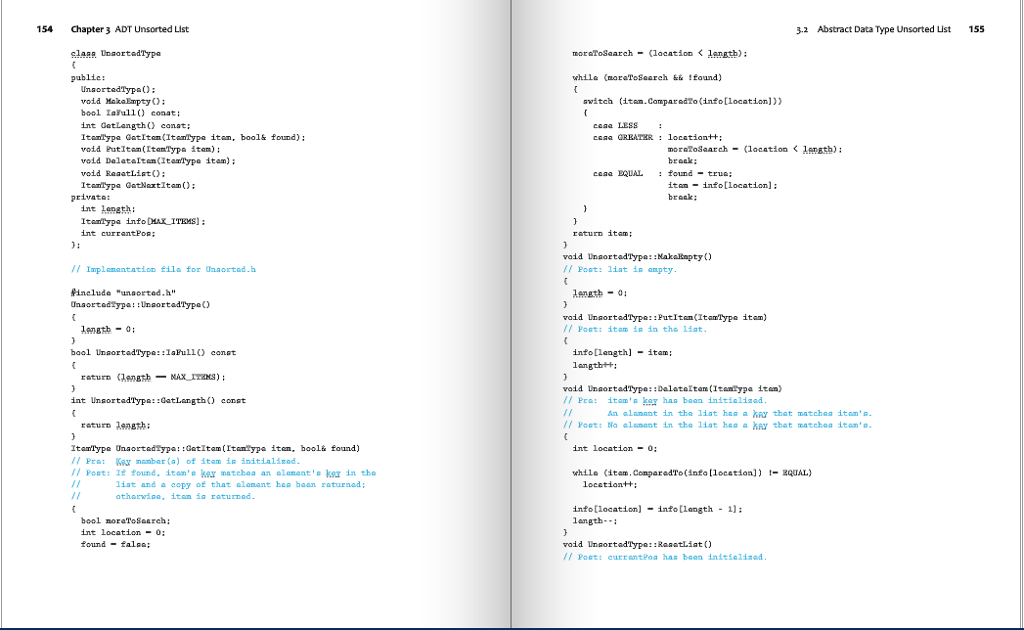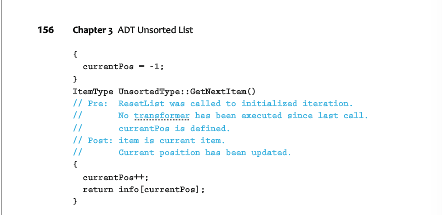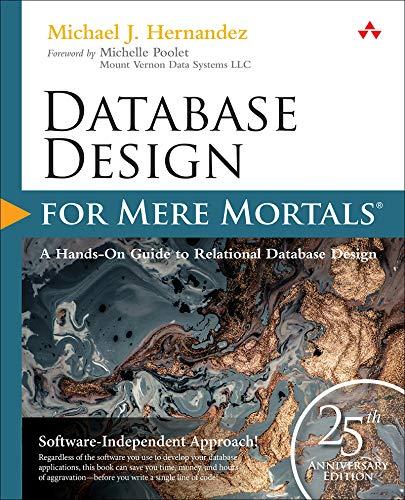Question
C++ Code Help Going to hand in a working implementation of the UnsortedType class detailed on page 154. The next project will be to add
C++ Code Help
Going to hand in a working implementation of the UnsortedType class detailed on page 154. The next project will be to add on to this class.
Use project files to get started:
See below
Use code in book after page 154 (or online resources) to start filling out unsorted.cpp and testing in unsorted_array_app.cpp.
Extra credit:
If PutItem results in a full list, expand the number of possible elements by double
for example, if list can store 10 elements, and the 10th is inserted, expand to a max of 20
Add a method to the unsorted.h and unsorted.cpp called IsEmpty() which returns true if list os empty or otherwise false
Add the overloaded [] operator (same operator used by vector and with arrays to access a specific 0-indexed element)
implement Insert(ItemType item, int position) and insert the ItemType at the specified position (you will have to swap anything after this position so every item is moved one position to the right. If you run out of room, as with PutItem, you must increase the capacity of the list.
What I want to see in the app file/output:
Use all of the functions available in the class definition (PutItem, DeleteItem, etc)
In the output I want to see the contents of the list and whether list is full or not
ItemType.cpp
// The following definitions go into file ItemType.cpp.
#include
#include
#include "ItemType.h"
ItemType::ItemType()
{
value = 0;
}
RelationType ItemType::ComparedTo(ItemType otherItem) const
{
if (value
return LESS;
else if (value > otherItem.value)
return GREATER;
else return EQUAL;
}
void ItemType::Initialize(int number)
{
value = number;
}
void ItemType::Print(std::ostream& out) const
// pre: out has been opened.
// post: value has been sent to the stream out.
{
out
}
ItemType.h
// The following declarations and definitions go into file
// ItemType.h.
#include
const int MAX_ITEMS = 5;
enum RelationType {LESS, GREATER, EQUAL};
class ItemType
{
public:
ItemType();
RelationType ComparedTo(ItemType) const;
void Print(std::ostream&) const;
void Initialize(int number);
private:
int value;
};
unsorted_aray_app.cpp
#include "unsorted.h"
using namespace std;
int main() {
// Create UnsortedType object
UnsortedType ut;
return 0;
}
unsorted.cpp
#include "unsorted.h"
using namespace std;
UnsortedType::UnsortedType() {
}
// Constructor
void UnsortedType::MakeEmpty() {
}
// Function: Returns the list to the empty state.
// Post: List is empty.
bool UnsortedType::IsFull() const {
return false;
}
// Function: Determines whether list is full.
// Pre: List has been initialized.
// Post: Function value = (list is full)
int UnsortedType::GetLength() const {
return 0;
}
// Function: Determines the number of elements in list.
// Pre: List has been initialized.
// Post: Function value = number of elements in list
ItemType UnsortedType::GetItem(ItemType, bool&) {
ItemType it;
return it;
}
// Function: Retrieves list element whose key matches item's key (if
// present).
// Pre: List has been initialized.
// Key member of item is initialized.
// Post: If there is an element someItem whose key matches
// item's key, then found = true and someItem is returned.
// otherwise found = false and item is returned.
// List is unchanged.
void UnsortedType::PutItem(ItemType item) {
}
// Function: Adds item to list.
// Pre: List has been initialized.
// List is not full.
// item is not in list.
// Post: item is in list.
void UnsortedType::DeleteItem(ItemType item) {
}
// Function: Deletes the element whose key matches item's key.
// Pre: List has been initialized.
// Key member of item is initialized.
// One and only one element in list has a key matching item's key.
// Post: No element in list has a key matching item's key.
void UnsortedType::ResetList() {
}
// Function: Initializes current position for an iteration through the
list.
// Pre: List has been initialized.
// Post: Current position is prior to list.
ItemType UnsortedType::GetNextItem() {
ItemType it;
return it;
}
// Function: Gets the next element in list.
// Pre: List has been initialized and has not been changed since last
call.
// Current position is defined.
// Element at current position is not last in list.
//
// Post: Current position is updated to next position.
// item is a copy of element at current position.
Unsorted.h
#include "ItemType.h"
// File ItemType.h must be provided by the user of this class.
// ItemType.h must contain the following definitions:
// MAX_ITEMS: the maximum number of items on the list
// ItemType: the definition of the objects on the list
// RelationType: {LESS, GREATER, EQUAL}
// Member function ComparedTo(ItemType item) which returns
// LESS, if self "comes before" item
// GREATER, if self "comes after" item
// EQUAL, if self and item are the same
class UnsortedType
{
public:
UnsortedType();
// Constructor
void MakeEmpty();
// Function: Returns the list to the empty state.
// Post: List is empty.
bool IsFull() const;
// Function: Determines whether list is full.
// Pre: List has been initialized.
// Post: Function value = (list is full)
int GetLength() const;
// Function: Determines the number of elements in list.
// Pre: List has been initialized.
// Post: Function value = number of elements in list
ItemType GetItem(ItemType, bool&);
// Function: Retrieves list element whose key matches item's key (if
// present).
// Pre: List has been initialized.
// Key member of item is initialized.
// Post: If there is an element someItem whose key matches
// item's key, then found = true and someItem is returned.
// otherwise found = false and item is returned.
// List is unchanged.
void PutItem(ItemType item);
// Function: Adds item to list.
// Pre: List has been initialized.
// List is not full.
// item is not in list.
// Post: item is in list.
void DeleteItem(ItemType item);
// Function: Deletes the element whose key matches item's key.
// Pre: List has been initialized.
// Key member of item is initialized.
// One and only one element in list has a key matching item's key.
// Post: No element in list has a key matching item's key.


Abstract Data Type Unsorted List 155 Chapter 3 ADT Unsorted List glaas DnaortedTypa publie: 154 3.2 moreToSearch-location
Step by Step Solution
There are 3 Steps involved in it
Step: 1

Get Instant Access to Expert-Tailored Solutions
See step-by-step solutions with expert insights and AI powered tools for academic success
Step: 2

Step: 3

Ace Your Homework with AI
Get the answers you need in no time with our AI-driven, step-by-step assistance
Get Started


